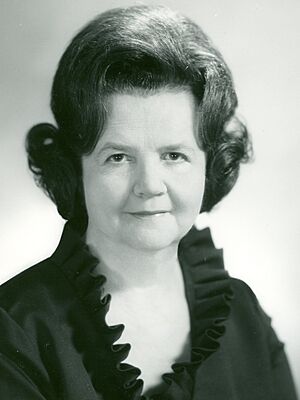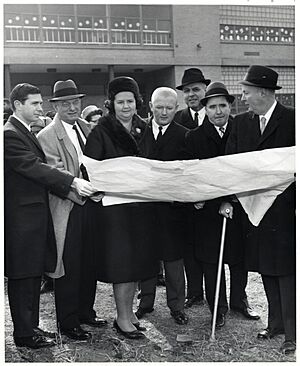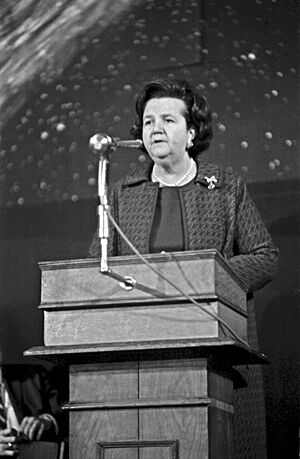Louise Day Hicks facts for kids
Quick facts for kids
Louise Day Hicks
|
|
|---|---|

Hicks c. 1969
|
|
| Member of the U.S. House of Representatives from Massachusetts's 9th district |
|
| In office January 3, 1971 – January 3, 1973 |
|
| Preceded by | John W. McCormack |
| Succeeded by | Joe Moakley |
| President of the Boston City Council | |
| In office 1976 |
|
| Preceded by | Gerald O'Leary |
| Succeeded by | Joseph M. Tierney |
| Member of the Boston City Council | |
| In office 1979–1981 |
|
| Preceded by | James Michael Connolly |
| Succeeded by | John W. Sears |
| In office 1974–1978 |
|
| In office 1970–1971 |
|
| Succeeded by | Dapper O'Neil |
| Chair of the Boston School Committee | |
| In office 1963–1965 |
|
| Preceded by | Joseph Lee |
| Succeeded by | Thomas S. Eisenstadt |
| Member of the Boston School Committee | |
| In office 1961–1970 |
|
| Personal details | |
| Born |
Anna Louise Day
October 16, 1916 Boston, Massachusetts, U.S. |
| Died | October 21, 2003 (aged 87) Boston, Massachusetts, U.S. |
| Resting place | Saint Joseph Cemetery West Roxbury, Massachusetts, U.S. |
| Political party | Democratic |
| Spouse | John Hicks |
| Parents | William J. Day Anna (née McCarron) Day |
| Alma mater | Wheelock College (B.A., Education) Boston University (B.S., 1952; J.D., 1955) |
Anna Louise Day Hicks (October 16, 1916 – October 21, 2003) was an American politician and lawyer. She was from Boston, Massachusetts. She is best known for strongly opposing desegregation in Boston public schools. This included court-ordered busing in the 1960s and 1970s.
Louise Day Hicks was a member of Boston's school board and city council for many years. She also served one term in the United States House of Representatives. She took over the seat from Speaker of the House John W. McCormack.
Contents
Early Life and Education
Louise Day Hicks was born Anna Louise Day. Her father, William J. Day, was a respected lawyer and judge in Boston. He was a big influence on her life. She studied home economics at Simmons College. Later, she earned a teaching certificate from Wheelock College.
She worked as a first-grade teacher for two years. After getting married and having two children, she went back to school. She earned a Bachelor of Science degree from Boston University in 1952. In 1955, she earned a law degree (Juris Doctor) from Boston University Law School. She then became a lawyer and worked with her brother.
Political Career and School Desegregation
In 1960, Louise Day Hicks was elected to the Boston School Committee. She served there until 1970. From 1963 to 1965, she was the chairwoman. During this time, she disagreed with civil rights groups. These groups wanted to integrate schools by busing students. This would help achieve a better racial balance.
Many schools in Boston had mostly black students. The NAACP (a civil rights organization) asked the school committee to admit this "de facto" segregation. This means segregation that happens in practice, not by law. Hicks and the committee refused to agree that segregation existed. She became a very well-known and debated politician in Boston.
In 1965, she gained national attention. She opposed court-ordered busing. This plan would move students to different schools to mix races. Hicks believed that Boston schools were being blamed for bigger problems. She said these problems included housing and economic issues for black citizens. She also pointed out that other schools were mostly one ethnic group, like Chinese or Italian.
Massachusetts passed a law called the Racial Imbalance Act. This law said that schools with more than 50% non-white students were "imbalanced." The state could stop funding schools that didn't fix this. Boston's School Committee was told to create a desegregation plan. They filed a lawsuit against the state, but the courts upheld the law.
Mayoral Campaigns and Congress
In 1967, Hicks ran for mayor of Boston. Her slogan was "You know where I stand." She lost to Kevin White by a small number of votes. After this, she was elected to the Boston City Council. In 1970, she won the Democratic primary for a U.S. House seat. This meant she was almost certain to win the general election.
Louise Day Hicks served one term in the United States House of Representatives from 1971 to 1973. She was the first female Democrat from Massachusetts in the House. Even though she was known for her stance on busing, she supported some progressive ideas in Congress. She was part of the National Organization for Women. She also worked to pass the Equal Rights Amendment.
While in Congress, she ran for Mayor of Boston again in 1971. She lost to Kevin White once more. In 1972, she ran for reelection to Congress but was defeated by Joe Moakley. He was a more liberal Democrat who ran as an independent.
After leaving Congress, Hicks led a group called "Restore Our Alienated Rights" (ROAR). This group strongly opposed busing. In 1974, Hicks returned to the Boston City Council. In 1975, a federal judge ordered Boston schools to expand busing programs. ROAR became very active in resisting these orders. In 1976, Hicks was elected the first woman president of the Boston City Council.
In 1974, a judge ruled that Boston's school policies had created segregation. The School Committee was ordered to bus thousands of students. This led to a lot of tension and some difficult situations in the city. Hicks and other leaders tried to calm crowds during these times.
Later Years and Passing
Louise Day Hicks was defeated for reelection to the Boston City Council in 1977. She later filled a vacant seat in 1979 but lost reelection again in 1981. After this, she faced health problems and retired from politics.
The responsibility for monitoring school desegregation was eventually returned to the Boston School Committee. The original court case was formally closed in 1990.
Louise Day Hicks passed away in Boston on October 21, 2003. She was buried at Saint Joseph Cemetery in West Roxbury, Massachusetts.
See also
- Boston busing crisis
- Women in the United States House of Representatives
 | May Edward Chinn |
 | Rebecca Cole |
 | Alexa Canady |
 | Dorothy Lavinia Brown |



